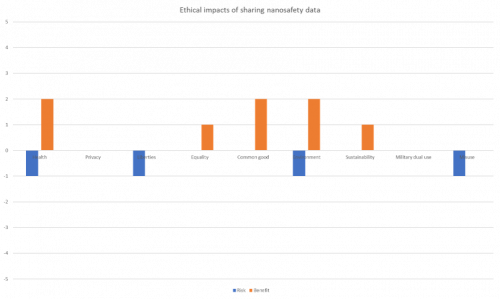- Malsch TechnoValuation
- Very responsive
- Posted by
Desired outcome
Companies and research organisations developing innovative materials and digital technologies for applications in health, food, sustainability and other ethically sensitive domains could benefit from Ethical Impact Assessment (EIA) to timely identify and evaluate ethical issues and co-create recommendations for remediating expected risks and promoting expected benefits, in dialogue with stakeholders. The EIA methodology based on CEN CWA 17145-2:2017 should be fine-tuned to better match market needs.
Initial Problem Description
Based on CEN CWA 17145:2-2017, guidelines and online tools supporting ethical impact assessment of nanomaterials and nano-enabled products were developed as a module in a multicriteria decision support system for safe and sustainable by design in the H2020 project RiskGONE: https://riskgone.eu/. This methodology should be fine-tuned to better match the needs of innovative companies interested in exploring and addressing ethical concerns already during R&D&I of their materials and digital technologies. Most sensitive ethical issues are expected in health, food and sustainability application domains. What is needed to adapt the EIA methodology to fit in an ESG (Environmental, Social, Governance) reporting framework, which is more commonly used by companies? Would prospective clients be more interested in ethics advice by external consultants, or in training of their staff to use the fine-tuned EIA methodology?
Context
Ethical issues of innovative materials and digital technologies are most prominent in health, food and sustainability. In health, issues include well-known biomedical ethical issues, but also emerging concerns of innovative technologies such as AI in healthcare, organ-on-chip, brain-implants etc. In food, public perception of novel foods and the use of digital technologies in the agrifood market strongly influence market success of innovations. In sustainability, balancing the transition to climate neutral societies with climate justice and inclusiveness poses big challenges to innovators and governments.
In all these cases, early identification and evaluation of ethical issues and co-creation of recommendations for remediating risks and promoting expected benefits could contribute to more robust medical devices and less economic risks for the company.
Connection to cross-cutting areas
General Sustainability: identifying and evaluating ethical concerns and co-creating recommendations for remedial action in an early stage of the R&D&I process contributes both to substantial ESG reporting and to the longer term sustainability of innovative materials and digital technologies.
Digitalisation: fast-moving developments in AI and other digital technologies and their uptake in ethically sensitive markets and societal domains raises unprecedented ethical issues. Identifying and evaluating these concerns and co-creating recommendations for remediation in dialogue with citizens and stakeholders in an early stage contributed to more robust technologies and improved relevance for urgent societal needs.
Input
This paper explains the methodology and analyses the results of testing it on several case studies in the H2020 project RiskGONE: https://open-research-europe.ec.europa.eu/articles/3-170. In this article, the procedure for an ethical impact assessment described in the CEN Workshop Agreement CWA 17145-2:2017 (E) is adapted to nanomaterials. Users who want to perform this assessment are guided through the procedure by online tools. The guidelines and tools were tested on several case studies and discussed with stakeholders, who commented on the criteria which should be used and on who could use the tools. This results in recommendations for improving the guidelines and online tools.
Expectations
So far, my company has most experience as consultant participating in publicly funded projects (mostly EU). It would be helpful if the team can advise on what is needed to become more visible and attractive to innovative companies and other innovating organisations, wishing to hire ethics advisors directly, outside the framework of publicly funded projects.
Desired Team Profile
It will be useful if at least one team member has expertise in business ethics,
Knowledge of current developments in ESG reporting frameworks is important, to better target companies interested in embedding ethical impact assessment in such a framework.
General knowledge of new materials and digital technologies, and preferably familiarity with healthcare, food, or sustainable technologies markets.
Additional Information
The EU imposes requirements to address ethical issues related to their R&D&I on companies and research organisations applying for funding under the Horizon Europe programme. In addition, projects are required to incorporate Social Sciences and Humanities tasks in their proposals. These requirements set international standards for embedding ethics and ethical impact assessment in innovation.
Related Keywords
About Malsch TechnoValuation
Consultant specialising in ethics and responsible innovation of emerging technologies for sustainable development. Sole proprietor. Strong involvement in publicly funded projects and frequently hired as ethics expert in ethics review of project proposals and as external ethics advisor for R&D&I projects. Coordinator of Duurzaam Utrecht 2030, an initiative aiming to engage with citizens with a low income about their wishes for living more sustainably, and letting young people take the lead in co-creating solutions together with the target group, municipalities, and a broad range of partner-organisations.

You need to sign up to apply to this challenge and submit a motivation letter!

Learn more about the topics and find team members!
Help
Need help submitting your proposal or have questions regarding this Open Innovation Challenge?
Contact support

